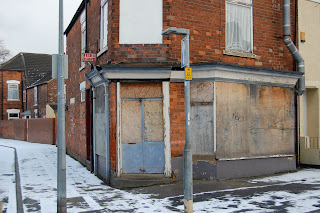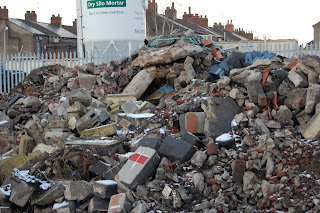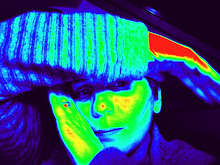A journey back in time...
So, here we are and I should really be off doing clever Trevor type things, but actually it's late and I have done a lot already in the last 2 weeks. I have, first of all, been pretending to be a proper PhD student and that has given me time to reflect on a lot of my own history, in relation to inquiring about other people's (of which more much, much later)
I spent my first day of PhDness taking photographs of where I used to live as a kid. Naturally enough this really got me thinking. About all sorts. I went with my sister to some of our old haunts and in a sort of circling way, we went all over the place for an hour or so until we finally made it to our old house. The centre of our lives until I was 18 (and she was 19). It was a weird old day because it was bitterly, bitterly cold in the way that it only can be in Hull with the wind whipping off the North sea, and because we remembered many of the same things, and that sense of shared memory gives you a sense that in spite of what people say or imagine you are, your siblings can confirm your sense of self when you start to think you may have imagined it. This is certainly true of Kim and myself, separated by one school year and nearly always together in a way that must have been quite aggravating for her, and really quite handy for me. Because she was tough, and I most certainly was not. She is better at the detail than me, the names of people and so on, and I have the benefit of having been away, and come back, which allows me a kind of distance - something a little more in the round.
We went to the church where we spent many a Sunday arguing over who was going to carry the flag on Church Parade day, and where we found pornography, where we were chased by the Hastie family and where we used to (allegedly - you're lying about this one Kim) met so that we could deliver our difficult (mine were much worse) papers together. My paper round took me down behind the bus station, and down Coltman street where the old woman who lived there would invite you into to her cat-piss stinking house, given half a chance and on St. Pancras Close where opposite the flat I delivered to was a young man with learning disabilities who, in my ignorance, scared the living shit out of me. It wasn't a million miles away from where baby Harry used to chase us either ("It's not me you want, it's me sister!" we each used to say, and because they weren't that bright, they seemed to believe us. Once, they threatened to beat me up because they said my picture was in Jacky magazine, because I had never had a boyfriend, oh alas, as if it mattered - BUT it wasn't my picture, I swear.) Are you sensing a pattern? I was chased a lot as a young person, better, I thought, and still do, to run and live to fight another day, then have your head kicked in by baby Harry's sisters. I used to run away from the ugly girl most nights after school, and she stayed ugly and I stayed safe (ish) - another Kim thing there - telling me that I should call her ugly TO HER FACE... and I was stupid enough to do it...

Our journey back in time moved from the church then down the Boulevard (less up market than it sounds, but more up market than it used to be...) We deviated and went to my mum's old work place - a chippie down Airlie Street. Okay, let me tell you about how not to regenerate a place. Do not take the main reason for a place's existence away and leave nothing in its stead. They built a fancy dan stadium for Hull City and Hull FC on the old cricket field, and the old ground of Hull FC, down Airlie Street was left literally to the dogs (greyhounds) until they buggered off somewhere else too. Everything just looked like it had had enough. The ghost given up and gone. These streets were sagged and ragged.
The chippie was boarded up. All those nights standing in there chewing the fat and all those scraps scoffed on the way home from Guides. All of that time, and all of those people who came and went and who enjoyed one another's company in that place: dead. Okay, I accept that I am being nostalgic - and with good reason, but communities need something to centre on, and shops form part of that. In the geographical area that I was brought up my sister and I calculated that there were 10-12 shops and small businesses that we used, depended on, and that depended on us. There was precisely one left. One.

It was worse than that. My sister and I used to go into Hull FC's ground at half time for nothing, have our faces blasted with gravel from the speedway, and as we got older, join our parents occasionally in the social club that stood beside it. My sister even held her children's christening parties in that place. This is it now: a pile of rubble. Okay, nothing is forever - I know that, but there is value to understanding what these communities meant to people and why we were close-knit. We had commonality. And if we want it in the future, we'd better look at what it might look like...for I honestly believe that if there's not enough to bind us altogether in a sense of common good, we are going to Hell in a hand-cart.


A cheery thought. That's not how it started. Or indeed how it will continue...
I spent my first day of PhDness taking photographs of where I used to live as a kid. Naturally enough this really got me thinking. About all sorts. I went with my sister to some of our old haunts and in a sort of circling way, we went all over the place for an hour or so until we finally made it to our old house. The centre of our lives until I was 18 (and she was 19). It was a weird old day because it was bitterly, bitterly cold in the way that it only can be in Hull with the wind whipping off the North sea, and because we remembered many of the same things, and that sense of shared memory gives you a sense that in spite of what people say or imagine you are, your siblings can confirm your sense of self when you start to think you may have imagined it. This is certainly true of Kim and myself, separated by one school year and nearly always together in a way that must have been quite aggravating for her, and really quite handy for me. Because she was tough, and I most certainly was not. She is better at the detail than me, the names of people and so on, and I have the benefit of having been away, and come back, which allows me a kind of distance - something a little more in the round.
We went to the church where we spent many a Sunday arguing over who was going to carry the flag on Church Parade day, and where we found pornography, where we were chased by the Hastie family and where we used to (allegedly - you're lying about this one Kim) met so that we could deliver our difficult (mine were much worse) papers together. My paper round took me down behind the bus station, and down Coltman street where the old woman who lived there would invite you into to her cat-piss stinking house, given half a chance and on St. Pancras Close where opposite the flat I delivered to was a young man with learning disabilities who, in my ignorance, scared the living shit out of me. It wasn't a million miles away from where baby Harry used to chase us either ("It's not me you want, it's me sister!" we each used to say, and because they weren't that bright, they seemed to believe us. Once, they threatened to beat me up because they said my picture was in Jacky magazine, because I had never had a boyfriend, oh alas, as if it mattered - BUT it wasn't my picture, I swear.) Are you sensing a pattern? I was chased a lot as a young person, better, I thought, and still do, to run and live to fight another day, then have your head kicked in by baby Harry's sisters. I used to run away from the ugly girl most nights after school, and she stayed ugly and I stayed safe (ish) - another Kim thing there - telling me that I should call her ugly TO HER FACE... and I was stupid enough to do it...

Our journey back in time moved from the church then down the Boulevard (less up market than it sounds, but more up market than it used to be...) We deviated and went to my mum's old work place - a chippie down Airlie Street. Okay, let me tell you about how not to regenerate a place. Do not take the main reason for a place's existence away and leave nothing in its stead. They built a fancy dan stadium for Hull City and Hull FC on the old cricket field, and the old ground of Hull FC, down Airlie Street was left literally to the dogs (greyhounds) until they buggered off somewhere else too. Everything just looked like it had had enough. The ghost given up and gone. These streets were sagged and ragged.
The chippie was boarded up. All those nights standing in there chewing the fat and all those scraps scoffed on the way home from Guides. All of that time, and all of those people who came and went and who enjoyed one another's company in that place: dead. Okay, I accept that I am being nostalgic - and with good reason, but communities need something to centre on, and shops form part of that. In the geographical area that I was brought up my sister and I calculated that there were 10-12 shops and small businesses that we used, depended on, and that depended on us. There was precisely one left. One.

It was worse than that. My sister and I used to go into Hull FC's ground at half time for nothing, have our faces blasted with gravel from the speedway, and as we got older, join our parents occasionally in the social club that stood beside it. My sister even held her children's christening parties in that place. This is it now: a pile of rubble. Okay, nothing is forever - I know that, but there is value to understanding what these communities meant to people and why we were close-knit. We had commonality. And if we want it in the future, we'd better look at what it might look like...for I honestly believe that if there's not enough to bind us altogether in a sense of common good, we are going to Hell in a hand-cart.


A cheery thought. That's not how it started. Or indeed how it will continue...






